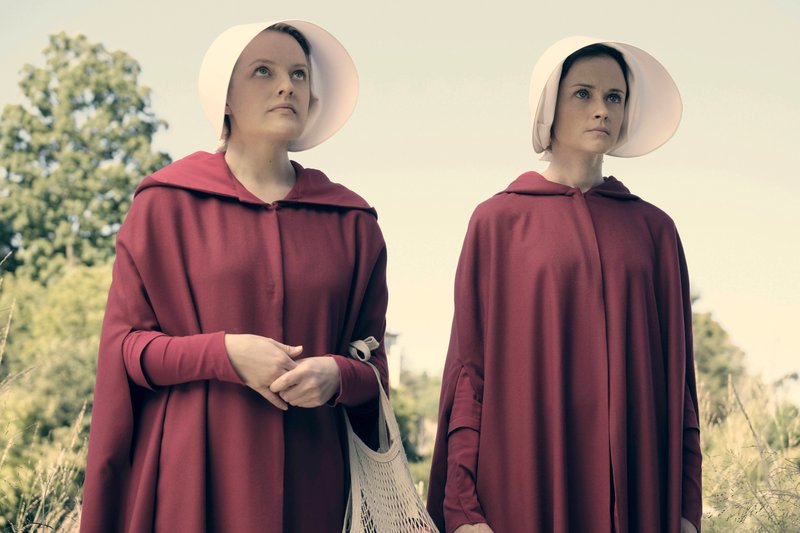If there is a urtext of modern feminism, especially for those of us who prefer it in the form of juicy dystopian novels instead of lofty essays, then Margaret Atwood's The Handmaid's Tale is probably the closest thing we've got. It's one of those books that people believe can tell a lot about another person based on what that other person thought of it.
Is your new boyfriend woke enough? Has he read The Handmaid's Tale?
Is your new book club smart enough? How do they discuss The Handmaid's Tale?
Has your relationship with your repressed Protestant mother festered for so long that you have never considered her as a complex woman with a rich inner life and unrealized desires and fears? Pour her a merlot and give her The Handmaid's Tale. That ought to get you somewhere, even if it's somewhere you later wish you hadn't gone.
It means something to people -- deeply, politically and almost spiritually. The new Hulu adaptation (Elisabeth Moss, Alexis Bledel) is a lot of things, but mostly it's validation for those fans among us who don't do cosplay as a rule, but who understand exactly the symbolism and the power of red capes and white bonnets.
Like a lot of good speculative fiction, describing the plot ends up short-selling the story, but for those who haven't read it we'll try: In a near-future universe of rising sterility and falling birthrates, the United States has been taken over by a right-wing theocracy. To rebuild the population, the new government has reintroduced the biblical practice of forced surrogacy (remember Rachel and Leah and their fertile handmaids in Genesis?).
Rich women get to be wives to "Commanders." Other women, if they can still bear children like the book's heroine, Offred, are made into handmaids. Sent to training centers to learn obedience. Made to wear red. Not allowed to control finances or read. All told in spare, ironic prose with not an extra ounce of flesh on it.
The book was published in 1985 to near-glowing acclaim, winning the Arthur C. Clarke prize, nominated for a Booker Prize and a Nebula Award.
Over the years, it has been assigned in college literature classes, yanked out of school libraries, celebrated and denigrated and feared and loved.
It has been banned. Of course it has been banned, appearing on the American Library Association's list of the top 100 banned books of the decade, for the 1990s and 2000s. People said it was anti-Christian (it's not, just anti-crazy fundamentalist) -- or had too much disturbing sex.
And what does Atwood, the creator of this world, think of all of this?
"Could it happen? How close are we?" says Atwood, 77, sharing what those questions typically are. "Especially, 'How close are we?' Especially that. When the book first came out in England, people said, 'Jolly good yarn,' because they'd already had their religious civil war. The Canadians, who are quite diverse, might not be able to gain the critical mass required to attain a monolithic theocracy. But Americans, it was either, 'It can't happen here, don't be silly,' or 'How close are we?'"
She doesn't know the answer. She doesn't know how close we are, as a society, or if we're close at all. She doesn't know what happens to Offred at the end of the novel. She doesn't even know Offred's real name. Over decades, readers decided it was "June" based on contextual clues -- June is the only character name, introduced in a roll call, who is not otherwise accounted for -- but it was never Atwood's original intent.
"I created a vacuum and it was filled," she says. "Not in an inappropriate way, but it wasn't my idea."
She wrote the book on a typewriter in 1984, and it happened in fits and starts because she just kept worrying it was too weird to present to an editor. Then she showed a draft to a trusted friend and said, "I think I'm going to get a lot of hate mail," and the friend said, "I think you're going to be rich," and both of them were right.
"Some books escape from the book itself, and this is one of them," she says. "It's been a film [Natasha Richardson played Offred in a 1990 adaptation]. It's been an opera -- a really good opera. It's been a ballet. It's being a graphic novel right now. It turns up as memes in elections. It's about to be a television series. It's recently been proposed to me that it should be a video game."
She wafts a hand. "It's out of the box. I feel as though it's no longer something I have control over. Not that you ever have control over the book."
The book is essentially a page-turning tour through every conceivable female nightmare. Loss of independence. Subjugation at the hands of men. Rape. Violence. Losing a child, or being thought of as less-than for being childless. All of it state-sanctioned.
It's inevitable that classic works are repurposed and reinterpreted in current contexts. A few weeks ago, a group of women walked purposefully into the Texas state legislature building wearing red capes and bonnets -- handmade handmaids -- protesting what they saw as the restriction of women's reproductive rights. Around the same time, some right-wing viewers who saw the show's trailer online criticized it in the comments as "anti-Trump propaganda."
Go ahead and read it as social commentary -- Atwood doesn't mind if you do.
She knows The Handmaid's Tale belongs to the world now.
Style on 05/02/2017

